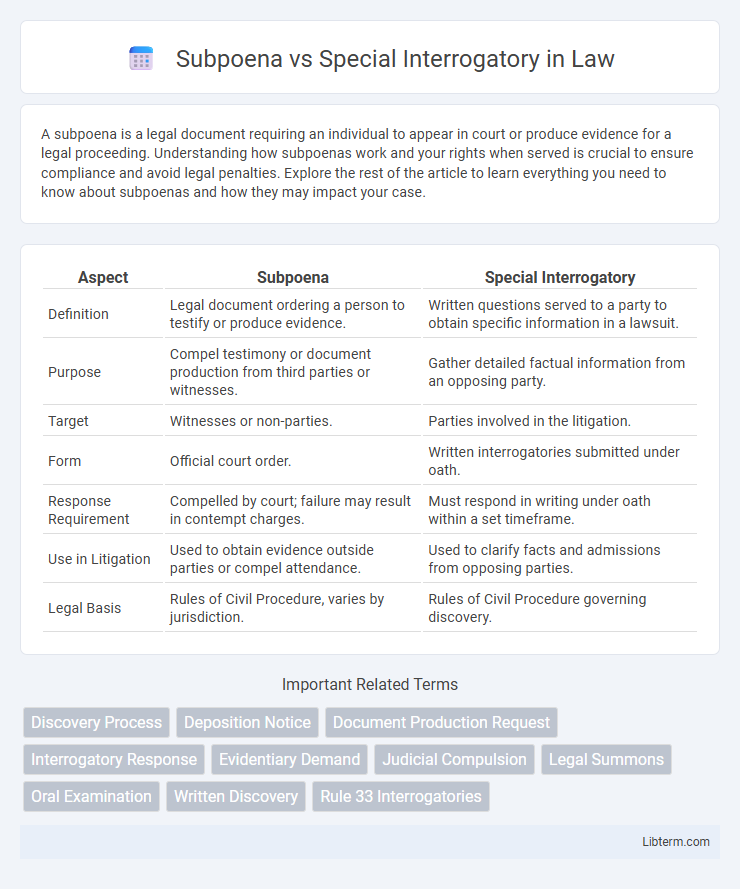A subpoena is a legal document requiring an individual to appear in court or produce evidence for a legal proceeding. Understanding how subpoenas work and your rights when served is crucial to ensure compliance and avoid legal penalties. Explore the rest of the article to learn everything you need to know about subpoenas and how they may impact your case.
Table of Comparison
| Aspect | Subpoena | Special Interrogatory |
|---|---|---|
| Definition | Legal document ordering a person to testify or produce evidence. | Written questions served to a party to obtain specific information in a lawsuit. |
| Purpose | Compel testimony or document production from third parties or witnesses. | Gather detailed factual information from an opposing party. |
| Target | Witnesses or non-parties. | Parties involved in the litigation. |
| Form | Official court order. | Written interrogatories submitted under oath. |
| Response Requirement | Compelled by court; failure may result in contempt charges. | Must respond in writing under oath within a set timeframe. |
| Use in Litigation | Used to obtain evidence outside parties or compel attendance. | Used to clarify facts and admissions from opposing parties. |
| Legal Basis | Rules of Civil Procedure, varies by jurisdiction. | Rules of Civil Procedure governing discovery. |
Understanding Subpoenas: Definition and Purpose
A subpoena is a legal document issued by a court or attorney compelling a person to attend a legal proceeding or produce evidence, ensuring the availability of crucial testimony or documents. Its primary purpose is to gather necessary information from non-parties or reluctant witnesses for the resolution of a case. Unlike special interrogatories, subpoenas have broader scope and enforceability in compelling evidence beyond written questions directed to parties in litigation.
What Are Special Interrogatories?
Special interrogatories are written questions served by one party to another during the discovery phase of a lawsuit, requiring written answers under oath. These questions help clarify facts, gather detailed information, and narrow the issues for trial. Unlike subpoenas, which compel third parties to produce evidence or testify, special interrogatories target parties directly involved in the litigation to obtain admissible evidence.
Key Differences Between Subpoenas and Special Interrogatories
Subpoenas compel the production of documents or witness testimony outside party discovery, while special interrogatories require written answers to specific questions directly from a party involved in litigation. Subpoenas can target non-parties and enforce court attendance or evidence submission, whereas special interrogatories are limited to parties and address detailed factual issues under oath. The scope and usage differ fundamentally, with subpoenas serving broader investigatory functions and special interrogatories focusing on clarifying facts within the parties' knowledge.
Legal Requirements for Issuing a Subpoena
Issuing a subpoena requires strict adherence to legal requirements, including proper service to the recipient and specifying the documents, evidence, or testimony sought. Courts typically mandate a valid legal basis and relevance to the case for the subpoena to be enforceable, ensuring protection of rights and preventing abuse. Failure to comply with procedural rules such as timing, content clarity, and jurisdictional limits can result in the subpoena being quashed or dismissed.
Drafting and Serving Special Interrogatories
Drafting special interrogatories requires precise, clear, and narrowly focused questions to obtain specific factual information during the discovery phase. Serving special interrogatories involves following court rules for format, number limits, and timely delivery to opposing parties, ensuring legally compliant and effective information gathering. Properly structured interrogatories facilitate efficient case preparation and minimize disputes over ambiguous or overly broad inquiries.
Situations Where Subpoenas Are Used
Subpoenas are primarily used to compel the production of documents, testimony, or evidence from third parties who are not directly involved in the litigation, serving as a critical tool in civil and criminal cases for gathering essential information. They are often issued when key evidence is held by external entities such as businesses, government agencies, or individuals outside the dispute, enabling attorneys to obtain records or secure witness appearances that interrogatories cannot reach. Subpoenas also play a vital role in deposition settings or when firsthand evidence is needed under oath, differentiating them from special interrogatories, which are written questions directed only to parties within the lawsuit.
When to Use Special Interrogatories in Litigation
Special interrogatories are best used in litigation when seeking detailed, written responses to specific factual questions relevant to the case, allowing parties to gather precise information from opposing parties. They are most effective during the discovery phase to clarify issues and narrow the scope of disputes before trial. Special interrogatories complement subpoenas by targeting information directly from parties rather than third-party witnesses.
Responding to Subpoenas vs. Special Interrogatories
Responding to subpoenas requires producing documents or testimony as mandated by the court or issuing party, often involving a wider scope and potentially affecting non-parties. In contrast, special interrogatories are written questions directed specifically to a party in the lawsuit, requiring detailed, verified answers under oath. The process for subpoenas may involve motions to quash or objections due to overbreadth or privilege, whereas responses to special interrogatories focus on carefully crafted, accurate, and legally compliant written responses within prescribed deadlines.
Potential Consequences for Non-compliance
Failure to comply with a subpoena may result in contempt of court charges, including fines or imprisonment, directly impacting the respondent's legal standing. Ignoring special interrogatories can lead to court sanctions such as default judgments or adverse inference rulings, affecting case outcomes. Both legal tools impose strict obligations, and non-compliance hampers discovery processes while exposing parties to significant judicial penalties.
Tips for Managing Discovery Using Subpoenas and Interrogatories
Effective management of discovery using subpoenas and special interrogatories involves clearly defining the scope of information sought to avoid objections and delays. Draft subpoenas with precise language targeting relevant documents or witness testimony while ensuring compliance with jurisdictional rules to enhance enforceability. Tailor special interrogatories to obtain specific, concise responses that clarify factual issues and minimize burdensome or evasive answers.
Subpoena Infographic

 libterm.com
libterm.com